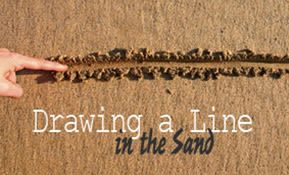
Vayera: Lessons from the Beach
The moment I surfaced, I took the most delicious breath of sweet, fresh air that I have ever had. In my whole life, the hardest battle...

When I was seven years old, my family took a trip to Hawaii. Though many years have passed, I can still picture the electric blue water, the gorgeous sunsets, and the red bathing suit with a built in Styrofoam belt that my four-year-old sister wore at the beach. Sure, she looked like a terrorist, but at least she was safe in the water. In hindsight, I should have found out if those bathing suits came in a larger size for boys.
One day when I was swimming in the ocean, I was hit by a powerful wave. I was pushed under and then sucked down by the undertow. I struggled violently as I was pitched back and forth and used every muscle in my body to try to swim to the surface and catch a breath of air. Although the ordeal only took moments, it seemed like a lifetime. The moment I surfaced, I took the most delicious breath of sweet, fresh air that I have ever had. In my whole life, the hardest battle I ever fought was in those moments when I thought I would lose it all.
The Binding of Yitzchak
The Binding of Yitzchak (Isaac), found in this week’s parsha, was one of the most dramatic events in Jewish history. The Torah relates that God tested Avraham (Abraham) by telling him to sacrifice his beloved son. Interestingly, we do not refer to the dilemma as, “The Test of Avraham” or even, “The Sacrifice of Yitzchak.” The binding, or tying, of Yitzchak to the altar, was a seemingly brief event. So why does the Torah refer to it as “The Binding of Yitzchak?”
The Torah’s name for a person or event captures its essence. At the time of the Akeidah (the binding), Yitzchak was thirty-seven years old, and his father, Avraham, was well over one hundred. It would have been impossible for Avraham to sacrifice Yitzchak had Yitzchak not consented. The Midrash relates that upon realizing that his father was about to sacrifice him, Yitzchak said:
“Father, I am a vigorous young man and you are old. I fear that when I see the slaughtering knife in your hand I will instinctively jerk and possibly injure you. I might also injure myself and thus become unfit for the sacrifice. Perhaps an involuntary movement might prevent you from performing the ritual slaughter properly. Therefore, bind me well, so that at the final moment I will not be deficient in honor and respect, and thereby not fulfill the commandment properly.”
Because Yitzchak was willing to give up his life to be a kiddush Hashem, to sanctify God’s Name, the test bears Yitzchak’s name. Being a kiddush Hashem requires one to act in accordance with God’s commandments and do His will in the physical world. Since God wanted Yitzchak to be a sacrifice, Yitzchak was willing to follow God’s will, even at the expense of his own life.
To Sanctify God’s Name
Rebbe Nachman says that the Jewish Peoples’ willingness to sacrifice their lives for Hashem is their greatest attribute and a tremendous source of merit. “Each day you should remind yourself that you would be ready to give up your life to sanctify God’s Name. This is the essence of Israel’s holiness” (Likutey Etzot, p. 245).
Therefore we learn that the highest spiritual level is to be willing to give up our lives for God. Further, it would seem that since this is the greatest spiritual accomplishment, it would be the most difficult to achieve. However, on a seemingly contradictory note, Rabbi Shlomo Wolbe, of blessed memory, who was a great rabbi of the mussar movement, said, “It is more difficult to live according to God’s will than to die according to God’s will.”
So which then is the greater challenge? Giving up our lives for God, or living according to God’s will? In order to rectify these two seemingly contradicting opinions, we must understand the specifics of Yitzchak’s spiritual achievement. In this day and age, one’s willingness to die in God’s Name carries a very negative connotation. How can we claim that giving up our life for God is admirable for us, and yet horrific when suicide bombers seemingly do the same thing in the name of their religious beliefs?
Man and Beast
Rabbi Menachem Meiri, a brilliant medieval Talmudist, explains that to remain alive is the most fundamental goal of all living things. Man tries to avoid death at all cost. The difference between man and beast is that while animals cannot desist from their basic nature, man can use his intellect to rise above his animal nature (Meiri, on Bava Kamma, 25b).
Our physical behavior is a reflection of our spiritual nature. A spiritually successful person is one who is able to suppress his animalistic instincts. Since the greatest animal instinct is the need to preserve life, the ultimate spiritual victory is to overcome this need. That was Yitzchak’s accomplishment when he willing allowed his father to bind him.
A midrash teaches that Yitzchak remained “bound” for the rest of his life. Rabbi Wolbe explains that Yitzchak never fell from that high spiritual level he attained on the altar. One who completely conquers his animal instincts is able to live a life free of base, physical desires. Yitzchak attained a very high level of spiritual perfection when he asked his father to bind him, and he merited to maintain that spiritual purity for the rest of his life.
Life is an Opportunity
It is possible to attain a level similar to Yitzchak’s without actually sacrificing one’s life. Life is the greatest blessing Hashem can bestow on His creation. There is so much pleasure and joy in this world! When I took that first breath of fresh air after being held under the surf, I realized that we benefit tremendously from even something as seemingly mundane as breathing! Every moment of our lives can be filled with unbelievable exhilaration, simply because we are alive! In addition to the great pleasure of life, God also gave us an even deeper pleasure; the ability to perform mitzvot.
A famous story is told about the Vilna Gaon. As he lay on his death bed, the great rabbi began to cry. One might assume that a person who had spent his life so devoted to learning Torah would be happy at the end of his life. After all, he was finally about to go to the place where he would reap the reward of his lifetime toil in Torah and mitzvot. One of his students asked him, “Rebbe, why are you crying?”
The Vilna Gaon reached down, and touched the strings of his tzitzit. “It’s so easy to fulfill God’s will in this world. For just a few coins, you can have such a great mitzvah! We lose that opportunity in the Next World.”
The Ultimate Sacrifice
This world is a beautiful place, and we certainly want to live each moment to its fullest! Yitzchak, however, was able to suppress his own needs in his desire to serve God. He was willing to do whatever God asked of him, even if it meant giving up his life.
Throughout our history, many of our ancestors willingly gave up their lives rather than live without Torah. When given the choice between conversion and death, almost all chose to forfeit their physical lives to spare their spiritual (eternal) existence. This heroic devotion to God by his people is the spiritual inheritance of our forefather, Yitzchak.
We should be careful to recognize the stark contrast between our beliefs and those of our enemies. A suicide bomber is not motivated by love of God. He is selfish, and honestly believes that through murdering Jews he will move from a lower existence on earth to an afterlife full of abundant physical pleasure. Although we embrace life, we aim to reach a level of devotion where we could give up our lives if that was God’s desire.
But God doesn’t want us to kill ourselves for Him. He wants us to live our lives for Him! He wants us to control our animal nature and to elevate ourselves as we become a reflection of the Divine image.
May the Almighty give us the strength to control our animal nature and to draw closer to Him.










